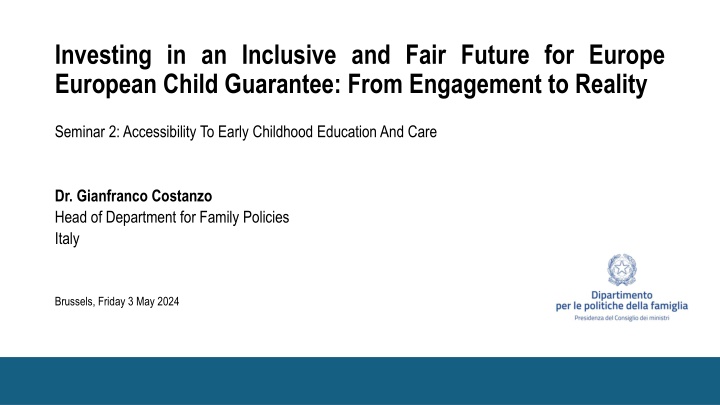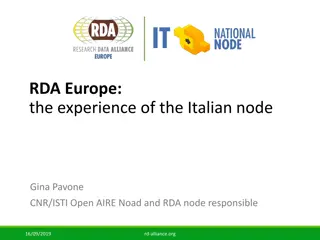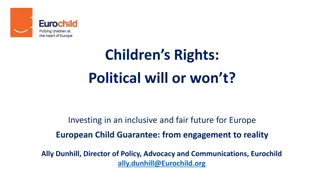Investing in an Inclusive and Fair Future for Europe - Italian Action Plan for Child Guarantee
Italian Department for Family Policies develops the National Action Plan focusing on early childhood education, health, poverty prevention, and governance. Through collaborative efforts and tangible practices, they aim to ensure children's rights, well-being, and educational opportunities. Initiatives like supportive family models and educational poverty projects demonstrate a commitment to social solidarity and community support.
Download Presentation

Please find below an Image/Link to download the presentation.
The content on the website is provided AS IS for your information and personal use only. It may not be sold, licensed, or shared on other websites without obtaining consent from the author.If you encounter any issues during the download, it is possible that the publisher has removed the file from their server.
You are allowed to download the files provided on this website for personal or commercial use, subject to the condition that they are used lawfully. All files are the property of their respective owners.
The content on the website is provided AS IS for your information and personal use only. It may not be sold, licensed, or shared on other websites without obtaining consent from the author.
E N D
Presentation Transcript
Investing in an Inclusive and Fair Future for Europe European Child Guarantee: From Engagement to Reality Seminar 2: Accessibility To Early Childhood Education And Care Dr. Gianfranco Costanzo Head of Department for Family Policies Italy Brussels, Friday 3 May 2024
ITALIAN CG ACTION PLAN (NAP) - THE PROCESS OF COORDINATION Development Process: Initiated in the second half of 2021, the development of NAP featured direct participation from key stakeholders Enhanced by contributions from professions' representatives, civil society and non profit sector Active participation of girls and boys by the Youth Advisory Board. Collaborative Framework: The NAP is a collaborative effort involving both institutional and non-institutional actors. Stakeholders also include experts, civil society, beneficiaries, and youth through the Youth Advisory Board (YAB). Coordination Mechanisms: National Observatory for Childhood and Adolescence, established in 1991, chaired by the Minister of family, consisting of about 50 members from public sector and NGOs Social Protection and Inclusion Network coordinated by Ministry of labour and social policies Monitoring Process: Implementation of the NAP overseen by the National Steering Committee, chaired by the Italian CG Coordinator. The Committee includes representatives from the Department for Family Policies, the Ministry of Labour and Social Policies, the Ministry of Education, the Ministry of Health, as well as Regions and Municipalities.
THE ITALIAN PLAN AT A GLANCE The 4 main areas of intervention: Early childhood education and care (ECEC), education, one healthy meal a day at school Right to health and healthy nutrition Prevention of and fight against poverty and social disadvantage, right to housing Governance and system infrastructure Alongside existing economic instruments (e.g. InclusionAllowance or Unique and Universal Allowance), the NAP develops a set of strategies aimed at promoting actions in three directions: stabilisation of interventions; strengthening of existing interventions, and innovation. Italy, in addition to implementing specific actions on childhood, has chosen to focus on the crucial role of families in combating child poverty.
TANGIBLE AND INSPIRING GOOD PRACTICES 1/2 The Department for Family Policies, among its institutional competences, addresses specific projects aimed to guarantee childrens rights and wellbeing: Pilot Project for the Development of a supportive family Model, in favour of vulnerable families : the model enhances family roles and parental skills in care and assistance, fostering peer support within the Italian Centers for families. Resourceful experienced families assist the more vulnerable ones, sharing guidance and mutual support, aimed at promoting child well-being and fostering a culture of social and community solidarity. Initiatives in the framework of the fight against educational poverty: The Department supports several experimental projects (public notices) on informal education to address educational poverty and enhance cultural and educational opportunities for disadvantaged children. During the pilot phase, the projects' social impacts have been monitored and evaluated to identify good practices.
TANGIBLE AND INSPIRING BEST PRACTICES 2/2 The Law No. 159 of 15 November 2023, introduces measures to address issues such as youth discomfort, educational poverty, juvenile crime, and digital safety for minors (e.g. age verification for online pornographic contents) Additionally, significant efforts to combat child poverty include the 21-27 National Programme on Inclusion and fight to poverty and the 21-27 National Programme on School and Skills. These European programs, led by Ministry of labour and social policies and Ministry of education respectively, are integral part of the implementation of the Italian NAP on CG, providing targeted funds for more than 1.4 billion euros. Recent initiatives: A public notice for the submission of Projects for the Inclusion and Integration of Roma, Sinti, and Caminanti children and adolescents; The innovative action DesTEENation - Desires and Actions in Motion supported by a public notice from the National Program on Inclusion and fight to poverty, is specifically addressed to the creation of Adolescent Communities as multifunctional experiential spaces across the national territory for the provision of integrated services.
THE ACCESSIBILITY OF EARLY CHILDHOOD SERVICES The implementation of 0-6 educational services is a crucial element in fostering the potential of future generations, ensuring that each child has the opportunity to develop into a balanced and complete individual. They include nurseries or kindergartens and integrative early childhood services (0-3 years); innovative services (0-6 years); preschools (3-6 years); and experimental integrated educational services (e.g. outdoor education). System Organization: Based on principles of subsidiarity and autonomy for education institutions.The State holds exclusive legislative power for general rules on education establishing the so called essential levels of performance (LEPs) valid over the entire country. Kindergarten and Early Childhood Services: Article 4 of Decree 65 of 2017 promotes the expansion, accessibility, and territorial balance of educational services for children under three, aiming for at least 33% coverage nationally. Financial Support Measures: Both national and regional initiatives aim to reduce the costs of early childhood education (0-3 years) for families. Examples include financial incentives like the bonus asili nido to help families paying the fees.
DATA Data collected and analysed by ISTAT for the 2021/2022 education year showed that the coverage rate of available spots for children aged 0 to 2 is 28%. This brings us closer to the European target set for 2010 (33%), but still falls short of the 2030 goal (45%). Central and northeast Italy spots coverage is well above 33% of resident children (36.7% and 36.2%, respectively), while the northwest is close to the target (31.5%), but the south and the islands, though improving, remain far behind (16.0% and 16.6%, respectively). The enrolment rate is much higher for preschool, with over 90% of children aged 3 to 5 years. The Multi-year Action Plan 2021-2025 of the Ministry of education for the development of the Integrated System of Education from birth to six years, allocates financial resources each year into an ad hoc National Fund. Regions use these funds through their planning in favour of local bodies (municipalities) for: new construction, renovation, building, safety improvements, and energy saving measures of public buildings hosting schools and child services; financing the operating costs of schools and educational services for children to reduce costs for families; continuous in-service training of educational staff and teachers.
LESSONS LEARNT Key focus areas in the Italian NAP on Child Guarantee Policy coherence: ensure alignment and increase the impact of social, educational, health, nutritional, and housing policies across national, regional, and local levels to support minors effectively. Infrastructure development: build and enhance administrative, social, health, and educational infrastructures, also thanks to funding programmed under the NRP. Importance of children Involvement Actively engaging children who benefit from the interventions is crucial for setting priorities and effectively implementing the UN Convention on the Rights of the Child framework Children involvement is supported in Italy by the Youth Advisory Board (YAB), ensuring that initiatives align with the actual needs of children, whose voice is taken into account.
Thanks for your attention! https://famiglia.governo.it/it/ https://www.lavoro.gov.it/ https://www.minori.gov.it/























